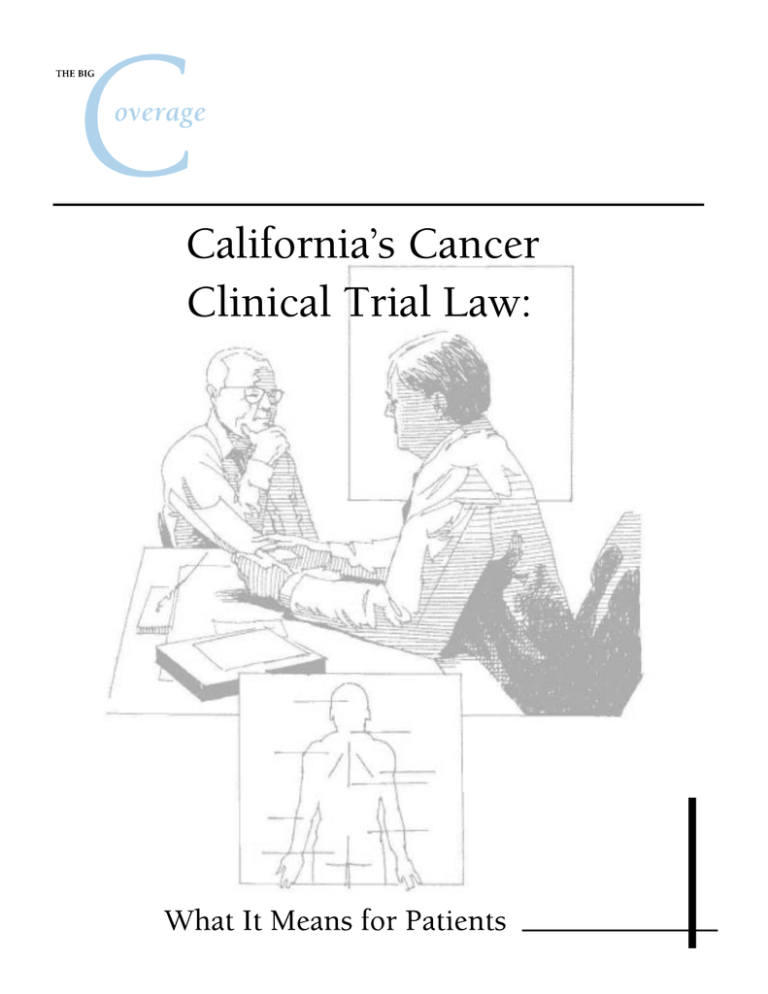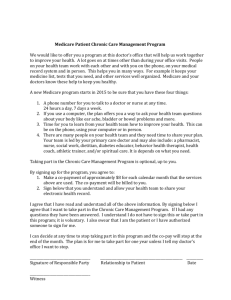California’s Cancer Clinical Trial Law:
advertisement

California’s Cancer Clinical Trial Law: A clinical trial is a study of a treatment or treatments to find out how well they work in certain patients. Introduction If you are a cancer patient, you and your doctor will consider a range of potential treatment options before deciding what is best for you. Many patients will do well with standard treatments. Others, however, may decide to receive care as part of a clinical trial. A clinical trial is a study of a treatment or treatments to find out how well they work in certain patients. This brochure, sponsored by the Association of Northern California Oncologists (ANCO) and the Medical Oncology Association of Southern California (MOASC), and researched and written by State Health Policy Solutions, will help you understand California law on clinical trials. The law protects patient access to high quality clinical trials by making sure that, under certain conditions, your health plan, such as a health maintenance organization (HMO), preferred provider organization (PPO), or point of service (POS) plan will cover and pay for your care while you are in a clinical trial. In the sections below, you will find answers to questions about the law in California. You also will find telephone numbers that you can call to get additional information. Questions & answers about California’s clinical trial law 1. What is a clinical trial and should you participate in one? A clinical trial is a medical research study designed to answer a scientific question. The purpose of a clinical trial is to find new or better ways of diagnosing, preventing, or treating certain diseases, such as cancer. Some clinical trials test a single new drug or treatment (or combination of treatments) to learn about how well it works and what side effects it has. Your physician will help you decide if participating in a clinical trial would benefit you. California’s law requires your health plan to cover the costs of the clinical trial so it will not cost you any more to receive care in the trial than to get any other cancer treatment. 2. What is California’s clinical trial law all about? The clinical trial law took effect on January 1, 2002. It requires your health plan to pay for routine patient care costs when you participate in certain cancer clinical trials. As with other health care services, you will have to share the financial responsibility. If your health insurance requ ires that you 2 California’s law requires your health plan to cover the costs of the clinical trial so it will not cost you any more to receive care in the trial than to get any other cancer treatment. make copayments and or pay deductibles for hospital and doctor services or medical testing, you will still have to pay these expenses. If you and your doctor decide that a clinical trial may offer a better treatment option than standard care (more than just measuring possible side effects), health plans, HMOs, and Medi-Cal are all required to cover routine costs associated with the treatment. You should first talk to your doctor about whether there are clinical trials available for patients with your type of cancer. Your doctor will also be able tell you whether any other conditions you may have, such as diabetes or heart disease, would prevent you from taking part in the clinical trial. Then, you should talk to your health plan to determine what will be covered before you enroll in a clinical trial. 3. What kinds of patients can benefit from the law? The clinical trial law c overs cancer patients who participate in Phase I, II, III, or IV cancer treatment studies that are approved by the National Institutes of Health (NIH), the U.S. Food and Drug Administration (FDA), Department of Defense, or Department of Veterans Affairs. Your physician will be able to help you understand if a trial that you are interested in meets the criteria in the law. Not all cancer clinical trials are approved by one of these agencies. If you enter a trial that is not, your health plan is not required to cover or pay for the care you get. 4. What services are health plans required to pay for? Health plans must cover and pay for routine health care services. These are the items and services that you would get whether or not you are in a clinical trial. This can include doctor visits, hospital stays, and medical testing. The law also requires health plans to cover and pay for drugs, devices, and services related to the clinical trial that they would cover even if you were not in the study. Finally, health plans must cover and pay for the cost of the treatment that you receive and any therapy needed to prevent, diagnose, or treat problems that might occur while you are in a clinical trial, as well as the costs of tests that your doctor performs to see if the treatment is controlling your cancer. 3 Health plans must cover and pay for routine health care services ...This can include doctor visits, hospital stays, and medical testing. 5. What services are not covered? Health plans do not have to cover or pay for any drugs or devices used in the study that are not FDA-approved. The government agency or pharmaceutical company that is sponsoring the trial will usually supply the drug to you at no cost. Neither must health plans pay for non-health care items such as: • the cost of travel to the treatment center, • housing or lodging, or • the cost of having a family member or partner accompany you during treatment. Health plans do not have to cover or pay for any item or service that your (or your employer’s) contract with them does not cover. For example, if your health insurance does not cover the cost of receiving drug treatment in your home, and the study calls for you to get care at home, you likely will have to pay for the cost of these services yourself. In many cases, you will need to get your clinical trial care from a doctor or hospital in California. Health plans have to pay for care at treatment centers outside California only if there is no health care provider in California taking part in the study. 6. What health plans does the law apply to and which ones does it not cover? The law applies to most of the health plans licensed to do business in the state of California. It applies to HMOs, PPOs, POS plans, and indemnity plans. The law also applies to Medi-Cal, the state’s health insurance program for low-income persons. It is important for you to know that the law does not cover all health plans. It does not apply to health plans that are specified as vision-only, dental-only, accident-only, specific to a single disease (such as cancer- only health plans), hospital indemnity, Medicare supplement, CHAMPUS supplement, long-term care, or disability insurance. The law also may not protect you if you receive your health insurance through your workplace and enroll in one of your company’s self-insured health plans or a plan that is subject to a federal law commonly called ERISA. Your human resources department at work can help you find out whether the law applies to your health plan. If your health plan is not required to cover the cost of care in a clinical trial, you and your doctor can still ask the health plan or your employer to pay for some or all of the costs incurred by taking part in a clinical trial. In many cases, care in a clinical trial costs the same as or less than standard treatment. If you or your doctor can show your employer and the health plan that it will not cost them any more to cover your participation in a clinical trial, they may agree to cover and 4 If you are enrolled in Medicare, you already have coverage for clinical trials. pay for your routine medical costs while you are in a study. If you are enrolled in Medicare, you already have coverage for clinical trials. Medicare covers routine patient care costs in certain government-approved clinical trials. Contact your Medicare carrier for more information or review your Medicare handbook. You can also find information on Medicare coverage of clinical trials at www.Medicare.gov. You can even download a Medicare brochure on how the program covers and pays for care in qualified clinical trials (www.medicare.gov/publications/pubs/pdf/clinical.pdf). Questions to ask your doctor and health plan about insurance coverage for your clinical trial Before you agree to participate in a clinical trial, you should understand all the medical and financial issues involved. You can use this list of questions to make sure you get all the information you need from your health plan. This list is in addition to the medical questions you should review with your doctor, such as whether a clinical trial is a good option for you and what its potential risks and benefits are. You may find the answers to some of these questions in your health plan membership materials. For others, you will need to call customer service at your health plan. a. Is the clinical trial approved by one of the federal agencies specified in the law? If so, which one? b. If your health insurance is through your employer, is your coverage subject to the state law? Or is your plan subject to the federal law called ERISA, which means that your health plan may not cover and pay for care in a clinical trial? You may need to contact your employer or customer representative at your health plan to get the answer to this question. c. What are your responsibilities for copayments and deductibles? d. What services does your health plan not cover or pay for? e. Does your health plan require prior approval of your participation in a clinical trial before it will cover and pay for services? How do you get prior approval? f. If your health plan refuses to cover care in a trial, or refuses to cover or pay for a specific service, how do you challenge its decision? g. Do you understand how to use California’s independent appeal law to challenge any decision by your health plan not to cover or pay for routine medical care services in a qualified clinical trial? 5 Health plans are not required to pay for the experimental drug that you might receive in a clinical trial. The government agency or pharmaceutical company that is sponsoring the trial will usually supply the drug to you at no cost. You can contact the Department of Managed Health Care (see below) for more information about the independent appeal law. Conclusions The California clinical trial law allows you to participate in a clinical trial without worrying about having to pay for the entire treatment yourself. It requires your health plan (if it approves the clinical trial) to cover the cost of routine medical services that you get while in the study. This gives you the freedom to think about taking part in a clinical trial without having to worry about how you will pay for it. Talk to your doctor about whether a clinical trial might be right for you. In California, two state agencies regulate health plans: the Department of Managed Health Care (DMHC) and the Department of Insurance (DOI). The DMHC regulates prepaid health plans, such as HMOs. The DOI regulates traditional indemnity health plans that are not prepaid. Consequently, if you have a question about the clinical trial law or need help resolving a problem, you will need to contact one of these two agencies. They can help you understand the law, how it works, or what it is intended to cover. These agencies cannot help you if you have either Medi-Cal or Medicare. If you are enrolled in a health plan that is not Medi-Cal or Medicare, you should contact: Department of Managed Health Care OR: California Department of Insurance California HMO Help Center Consumer Communications Bureau 980 Ninth Street, Suite 500 300 South Spring Street, South Tower Sacramento, CA 95814-2725 Los Angeles, CA 90013 Telephone (general information): (916) 324-8176 Consumer hotline: (800) 927-4357 Fax: (916) 322-9430 www.insurance.ca.gov/docs/index.html www.dmc.ca.gov 927HELP@insurance.ca.gov helpline@dmhc.ca.gov If you are in Medi-Cal, you should contact: Department of Health Services Division of Medical Care Services PHONE: (916) 657-1460 www.medi-cal.ca.gov 6 Talk to your doctor about whether a clinical trial might be right for you. You may also contact the National Patient Advocate Foundation for help with any dispute that you have with your health plan over care in a clinical trial. You can reach this organization at: Patient Advocate Foundation 753 Thimble Shoals Boulevard, Suite B Newport News, VA 23606 www.npaf.org action@npaf.org (800) 532-5274 or (757) 873-0438 ANCO and MOASC extend their thanks to the following professionals and organizations for their help in creating this brochure: Sandra Bressler Mariana Lamb, Executive Director, California Medical Association Physician Board of Directors Medical Oncology Association of Southern California Richard Figueroa Office of California Governor Gray Davis Janine MacMillan National Patient Advocate Foundation George Fisher, M.D., Ph.D. Stanford University Irene Paulin Bristol-Myers Squibb Oncology Martin Gallegos California Department of Managed Health Care Richard Steffen Office of California State Senator Jackie Speier Jose Gonzalez, Executive Director, Physician Board of Directors Margaret Tempero, M.D. Association of Northern California Oncologists University of California, San Francisco David Gandara, M.D. & Primo Lara, Jr., M.D. Debra Thaler-DeMers, R.N. UC Davis Cancer Center National Coalition for Cancer Survivorship 7 This brochure was made possible by an unrestricted educational grant from Bristol Myers Squibb Oncology. This brochure was researched, written, and edited by Vikram Khanna, Namita Varma, Ph.D., and Pam Barry of State Health Policy Solutions, LLC, of Ellicott City, MD. NCI #CA10172 © 2003, ANCO, MOASC and State Health Policy Solutions, LLC. All rights reserved. Any unauthorized use of this document, including content changes, without the written permission of ANCO, MOASC, and State Health Policy Solutions, LLC is expressly prohibited. Association of Northern Medical Oncology Association of State Health Policy California Oncologists Southern California Solutions, LLC P.O. Box 151109 123 East Ninth Street, #202 8378 Governor Grayson Way San Rafael, CA 94915-1109 P.O. Box 161 Ellicott City, MD 21043 Phone: (415) 472-3960 Upland, CA 91785 Phone: (410) 480-5277 Fax: (415) 472-3961 Phone: (909) 985-9061 Fax: (410) 480-5278 Fax: (909) 985-8581 www.statehealthpolicy.com Email: vik.khanna @statehealthpolicy.com 8





